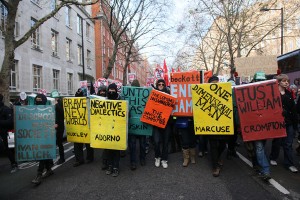Technology and transformation
Posted on by adminIt’s been an astonishing week.
I’m a (self funding – only because I got a free education, paid my taxes etc…) doctoral researcher at St Andrews and my subject is the impact of technologies on the art we produce, specifically on poetic voice and music. A sub heading might be ‘why kids like hiphop/dubstep etc… but you can’t get them to read poetry’. This summer I was teaching poetry to 16 year olds and though my lessons were unconventional, and not all a success, there were amazing moments when I heard the voices of my own tutors (Don Paterson, Kathleen Jaimie, Robert Crawford, John Burnside) in my head and really felt the master/student continuum. In short, I taught my kids something (via Alexander Pope and Dolly Parton) and they taught me something. Yet poetry is not the sort of subject that is likely to get me any kind of job, except in teaching, and one that the new fees system will not encourage students to study. So this weeks events have raised the question for me – if no one studies it, who will teach it to the next generation and the next. Or philosophy, or art, or music. And without them, what kind of society will it be?
I’ve spent the last couple of months writing about how the invention of telegraphic communications, recorded sound and cinema informed the work of artists at the turn of the last century. Back then, the dramatic pace of technological and scientific change inspired great artistic movements and powered the change towards the modern western democracies we know. Excerpt:
The ubiquitous nature of temporality the Einsteinian revolution has introduced necessarily presents any sociological or critical analysis with the problem of relativism. The observer and the observed are locked together in a reality that is entirely ‘perspective-dependent’. As David R. Maine suggests ‘Time and communication always interpenetrate’ (305):
Until now, I never understood what Twitter was for – what Stephen Fry was having for lunch at an airport never interested me much. But what a 16 year old was experiencing while ‘kettled’ on Westminster Bridge, now that really is interesting – and I’ve become familiar with ‘trends’ and ‘hashtags’ and I watch the videos, read the blogs that people are posting and which counter the coverage that the mainstream media are churning out. (NB. Dismayed that the BBC, with the exception possibly of Paul Mason, are so terrified of this government that they are covering the student protests like they were the subs on the Daily Mail). Or maybe they’re just out of touch, they don’t understand that the protesters real-time interaction with networked media is a powerhouse for change. I didn’t until Thursday.
In On the Genealogy of Morals (1887) Neitzsche tells us that multiple perspectives are necessary in the service of key philosophical constructs such as ‘truth’ and ‘knowledge’.
‘There is only a perspective ‘seeing’, only a perspective ‘knowing’; and the more affects we allow to speak about one thing, the more eyes, different eyes, the more complete will be our “concept” of this thing, our ‘objectivity’…
This week I saw middle class kids empathizing with the angry, urban kids who were about to lose the EMAs that help them go to ‘college’. That kid with his banadana across his face, saying ‘ If you take away this 30 quid allowance, what’s to stop me ending up selling drugs on the street’. He’s right, and you know what, I had no idea about the EMA and its proposed abolition. The student protests, for all the negative press and the media emphasis on the violence of the protesters, (not so much on the violence of the police), have brought important issues to light. His mate said, ‘yer get me’ and now, because of the protester’s dissemination of this information, I do. Not everyone does, but now a lot of people do. This leveling of perspective, this solidarity, that the protesters are experiencing, is happening because of the technologies that empower them.
There are things that as a dyed in the wool Labour voter I accepted from the Blair government and I question the wisdom of that now. In a Wikileaks kind of way, I figured there had to be real political imperatives behind our decision to enter the war in Iraq (maybe the US were going to withdraw all their defence spending from British Aerospace, or close all their UK military bases resulting in a load of ordinary working men and women losing there jobs?) I didn’t know the truth of it, but I trusted the Blair government and supported their decisions. Now I think they were wrong (and so was I).
So I can understand why young people looked for alternatives to Labour, I understand why Clegg and co seemed attractive, but the old adage, ‘vote Liberal, get Tory’ turned out to be true. A few months on and the streets are filled with smoke, children are being beaten and their grievances misrepresented. It could be profoundly depressing, but the student protests are energizing a spirit of rebellion in a population grown fat on our own complicity with the free market economics of successive Tory and Labour governments. We all have to take responsibility for it for sure, but it’s understandable that the ridiculous excesses of the banking class are hard for people to stomach. The poor, the sick, the young – there is no justification for swingeing cuts that will affect their wellbeing and damage their futures. Not while we hear of people taking bonuses of £40 and £50 million and corporations dodging their tax. And we do hear. For the first time in history there is an unmediated platform for the opinions and interests of the masses. No media tycoons, no repressive governments, no financial institutions, can impede its vision. There are many eyes and they’re telling us what they can see.
The dubstep rebellion
Good film
Amazing pictures
15 year old speaks
